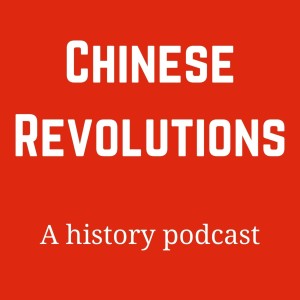
Definition of Revolution We'll Be Using
Here, we’re going to discuss the definition of “revolution.” It’s too easy to look at the CPC and think that’s what the revolution produced. No, there were other Chinese revolutions, and before we look at what THOSE were, we’ll look at what revolutions are.
Inspiration for this Podcast
Before I get away into my own program too much, I owe a debt of inspiration to the Revolutions podcast by Mike Duncan.
He's gotten various suggestions to cover Chinese content. I know—I sent him one myself. Then I thought, I could do that!
So here we are.
Follow the link or search for it on your favorite podcast app. (Tell him I sent you!)
Definition of Revolution
Basically:
- The rules change
- The foundational facts change—or are seen to change
Revolution is basically an opportunistic infection. It takes advantage of unusual weakness in a political system.
My definitions are yoinked directly from the Wikipedia article on revolution.
Definitions in this episode rely heavily on quotations in the Wikipedia article from the work of Jeff Goodwin. I quote him as "he's who Wikipedia quoted," but let's do him justice in the show notes.
For the show notes...
Political Revolution
Revolutions are planned. There's a smaller group of people organizing it. They follow a popular impulse. Most ordinary people don't have the capacity to plan, so it's this small group that drives things.
Social Revolution
Who's in charge changes, why they're in charge changes. Family, business, community—it all changes. Social revolution often accompanies political revolution.
Insights from The Dictator's Handbook
When I prepared this episode, I used a summary from this website to get my notes straight. Thanks, Mr. Sustainability!
The Dictator's Handbook: Why Bad Behavior is Almost Always Good Politics by Bruce Bueno de Mesquita and Alastair Smith provides foundational insights into why China was so ... revolutionary from the early mid-1800s to 1949.
These are the rules that Chinese rulers couldn't somehow keep:
Rules of Political Power
(Copied directly from Mr. Sustainability, just to be clear.)
- Politics is about getting and keeping power, not the welfare of the people.
- Political power is best ensured and maintained when you depend on few essential cronies to attain and retain office (dictators are often in a better position to retain power than democrats).
- Depending on a small coalition of cronies allows leaders to tax at higher rates.
- Dictators have the most power when the essential cronies are easily replaceable.
Dictator's Rules
- Keep the winning coalition as small as possible: you will need fewer people to stay in power, have higher control over them, and you will save on graft (smaller number also mean it easier for them to organize a putsch however).
- Keep the nominal selectors as large as possible: so that you can easily replace troublemakers among the influentials and essentials, and sends the essentials a message that they better behave.
- Control the flow of revenues.
- Pay your essentials just enough to keep them loyal: and keep them away from the source of money.
- Don’t take money out of the essentials’ pockets to make the people better: dictators depend on essentials, not on average citizens.
Ways to Remove an Incumbent (and Chinese revolutions followed these very regularly)
- Wait for him to die.
- Strike at the right opportunity (old leader, a faux pas, a financial crisis).
- Make an offer and/or convince the current supporters to switch sides.
- Overthrow the government through internal revolution or war with a foreign power.
So...
Why Chinese Revolutions Kept Happening
Ways to remove an incumbent kept opening up until the Communist Party nailed things down.
Revolutions kept happening because there were problems the authorities:
- couldn't solve
- wouldn't solve
Will Durant in The Story of Civilization: Our Oriental Heritage stated in reference to the founding of a Japanese dynasty that a founder uses up half the genius of a dynasty in founding it.
When we get to the CPC, it will be interesting to see what a succession-by-adoption opens up.
If You'd Like to Support the Podcast
- Subscribe, share, leave a rating. THIS IS FREE!
- Give once, give monthly at www.buymeacoffee.com/crpodcast
- Subscribe to the substack newsletter at https://chineserevolutions.substack.com/
Also...
Please reach out at chineserevolutions@gmail.com and let me know what you think!
Comments (0)
To leave or reply to comments, please download free Podbean or
No Comments
To leave or reply to comments,
please download free Podbean App.